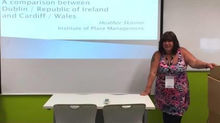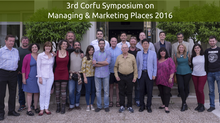Authenticity and Tourist Experiences
- Aug 21, 2014
- 4 min read
There appears to be an increasing quest for authenticity in tourists’ experiences, both from a supply and demand perspective.

Issues of ‘connecting’ people and places therefore become important for place managers and marketers, for a wide range of tourism-related businesses, and also for tourists themselves.
From the supply side, tour operators and others involved in providing tourism services at a destination decide what activities and experiences will be offered to those who choose to visit that destination. Independent travelers may choose to wander off the beaten track to search out more ‘authentic’ tourism experiences.
For example, “The television comedy series Gavin & Stacey first aired onBBC 3 on 13 May 2007, moving via BBC 2 to BBC 1, running for a total of 20 episodes including Christmas Specials. Gavin & Stacey attracted a viewing audience of 543 000 for its first episode in 2007, rising to 10 250 000 for its final episode in 2010, with countless more people viewing the programme on DVD and on digital channel repeats …. Prior to the [official] tour being established in June 2010, tourists had created their own ‘DIY tours’ of locations from the series” [1].
I live in Corfu, and am aware of many of the trips offered to tourists by major tour operators. Some indeed engage tourists with the authentic Corfu with which I am familiar, however, some trips appear to be based more “upon what Atkinson Wells (1994) terms ‘fakelore’. Goulding (2000) takes this notion even further, asserting that any commercially driven analysis of history tends to become inauthentic from being sanitised to serve popular tastes” [2]
Many years ago I visited Florida. While I did visit a number of theme parks when I was there, I chose not to go to EPCOT’s “World Showcase” where I could ‘experience’ an ‘authentic’ sing-a-long in a traditional ‘English Pub’ where I could wash down my fish & chips with some authentic ale, or to take a safari at Disney’s Animal Kingdom. Instead, I took a short cruise to the Bahamas and had a lovely time eating fresh crab cocktails in a lovely beach bar, and taking a tour of the sights of Grand Bahama, and I have already been lucky enough to visit a number of African countries in the past and go on an authentic safari. However, my friends who did indulge in the full theme park experience thoroughly enjoyed their time, and thought I was a bit mad for wanting to escape these manufactured experiences, if only fora short part of our holiday. Neither did they experience a car breaking down late at night in the African bush, being stopped at gunpoint by security services (very shortly after we’d got the car working again), or being charged by a rather annoyed rhino – all of which happened to me on one particular holiday in Africa.
When I visited the Republic of Ireland, I participated in the Thanatourism experience offered by the Dunbrody Famine Ship, I also thoroughly enjoyed my visit to the Jorvik Viking Centre on a trip to York., yet I definitely would not have enjoyed the authentic lived experiences of those whose stories they present.
I read on a Facebook group today, a post about some archaeological ruins in a resort here on Corfu. There is no restriction of access to the site, but also no attempt at preserving these historic ruins, and no method used of explaining the site to tourists apart from the brown sign directing visitors to the site – this is often the case with many similar sites of historic interest across the island. As a visitor, on the one hand I would like a little more information about such places, but on the other I would dread being greeted by fully ‘authentically attired’ guides who would direct every minute of my navigation around them.
I find it impossible to separate issues of authenticity with issues of cultural heritage, which can also lead to further questions of not only which aspects of culture and heritage is being presented to tourists, but also whose culture and whose heritage is being presented, especially in countries with contested, renewed, or new identities.
Social media is also facilitating tourists to share their experiences more widely than ever before. The words they write and images they share are also affecting others’ views of places. No longer do we tourists necessarily believe the brochure images or tour operators’ promotional messages about a destination, seeking rather to search out tourist generated content about a place we intend to visit – because we believe this will be more authentic.
As tourists seek more authenticity in their experiential consumption of destinations, those responsible for creating, communicating and delivering these experiences need to consider very carefully not only what they offer, but also what is perceived by tourists themselves about these experiences. I would like to see much more of a careful line drawn between presenting something in a way within which tourists can find meaning, and over-manufacturing the experience to a point where authenticity is lost.
References
1 Skinner, H. (2014) ‘What’s Occurring? Barry since Gavin & Stacey’, International Journal of Tourism Research - [http://onlinelibrary.wiley.com/doi/10.1002/jtr.2001/abstract]
2 Skinner, H. (2011) ‘In search of the genius loci – the essence of a place brand’, The Marketing Review, 11(3), pp. 281-292























Comments